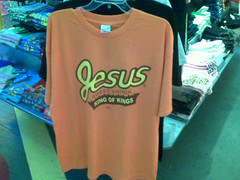 Image by beedubz via FlickrI've got mixed feelings about Christianity Today, but I still subscribe to their RSS feeds and occasionally read their articles (everything that isn't political or involve a movie review, basically). I suspect I do this mostly out of habit; they occasionally do a good job of handling a news story, for example, but I get the impression that by and large they represent their publisher and its interests, along with the viewpoints of people who were young and vibrant in the mid-Seventies but are now well past their prime. I guess I'm thinking of Chuck Colson and Philip Yancey, but frankly I don't look very closely at the by-lines of their articles.
Image by beedubz via FlickrI've got mixed feelings about Christianity Today, but I still subscribe to their RSS feeds and occasionally read their articles (everything that isn't political or involve a movie review, basically). I suspect I do this mostly out of habit; they occasionally do a good job of handling a news story, for example, but I get the impression that by and large they represent their publisher and its interests, along with the viewpoints of people who were young and vibrant in the mid-Seventies but are now well past their prime. I guess I'm thinking of Chuck Colson and Philip Yancey, but frankly I don't look very closely at the by-lines of their articles.Anyway, today they're offering a review of Brand Jesus by Tyler Wigg Stevenson. The eye-catching quote is this:
What would you think if you were in a modern auditorium and heard the presenter make "The wild claim that the messiah had arrived sometime in the mid-seventies; that he had been an undocumented Filipino migrant worker who spoke about the inbreaking kingdom of God; that, while working in Guam, he had been brought in by the local ecclesiastical authorities on trumped up civil charges; that the local governor had caved to their demands and executed him for treason; and that his life and death changed everything we thought we knew about God, the world, and ourselves"?
That would be no more bizarre than what Paul said in his letter to the Romans. But the gospel isn't strange or shocking to modern Westerners. Brand Jesus argues that the fact that Jesus seems normal to us is one of our biggest problems.
How did Americans normalize Jesus? The short answer is "consumerism." In a free-market, Jesus has become virtually indistinguishable from any other brand or consumer choice — hence, "Brand Jesus."
I'm not going to parse his use of Filipino-Guam-America as Jew-Palestine-Rome here; doing so doesn't really speak to his central point, which is to say that we as American Christians have domesticated the radical, counter-cultural message of Christianity, not least by wrapping it in a subculture complete with its own national anthem and Gross Domestic Product.
I'm curious to see what else Stevenson has to say, because I suspect he doesn't go far enough. I honestly believe that Christianity is not well served by even the scholarly Jesus junk we surround ourselves with:
- Megachurches
- Christian celebrities
- Study Bibles
- Theologians
- Conferences
- Revivals
- "Leadership" generally
Tyler Wigg Stevenson links: [1] [2].
![Reblog this post [with Zemanta]](http://img.zemanta.com/reblog_c.png?x-id=4fd649c8-afc8-4501-839a-4c68146cf91d)

No comments:
Post a Comment